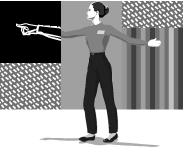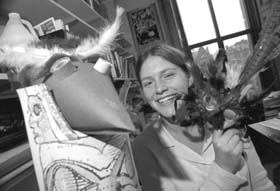

|
Relief from legal headaches

Damion Stodola and Meg Steele (Photo: Owen Egan)
Does your landlord want to evict you? Do you suspect your business partner of shady dealings? Does your mother want to disinherit you?
If you're facing a dilemma with legal dimensions and you don't know who to turn to for advice, a good first step would be the McGill Legal Information Clinic, located in the basement of the University Centre on McTavish.
Open weekdays between 9 am and 5 pm, the clinic is staffed by McGill law students who provide information on a wide range of legal situations.
"We can't provide any kind of legal advice per se," says the clinic's director Meg Steele, "but we can look into the situation for you, tell you what your options are and let you know what the state of the law is concerning your problems."
Damion Stodola, the clinic's publicity and publications director, says Quebec law is quite strict about the services law students can provide -- they can't represent clients in cases or act as substitute lawyers in any formal sense. He says Quebec is stricter in that regard than most provinces.
In fact, law training in Quebec "tends to be quite theoretical" in its focus -- one reason why law students enjoy putting their knowledge to more practical applications at the clinic.
About 175 law students volunteer at the clinic over the course of a year. They deal with about 10,000 queries on an annual basis.
"We see a lot of marriage and divorce situations, a lot of immigration situations," says Stodola. "In September, there are many landlord/tenant problems," adds Steele. "Students arrive in Montreal, find out their apartments are terrible and wonder what they can do."
The clinic also plays a vital role in student disciplinary and grievance cases, supplying legal advisors to students facing charges of wrongdoing or pursuing gripes against the University. Stodola says the clinic's volunteers relish taking part in such cases -- it's as close to being real lawyers as they're allowed to get.
"We receive a lot of cooperation from the University," says Stodola. "It sees us as an important part of that whole process."
The clinic operates its own radio show on CKUT 90.3 FM called Legal Ease.
"We deal with topical issues. When the big court ruling came down on the child porn case, for instance, we tried to explain what the ruling actually meant," says Stodola.
The bi-weekly show, which is about to switch to a weekly status, recently pulled off a coup -- former Law and Order star Jill Hennessy, in town to shoot a movie, guested on a Legal Ease show that centred on how the law is portrayed on TV and in film.
Anyone wishing to get in touch with the clinic can call 398-6792.
|
|
Researching with respect
Dr. Charles Weijer, from Dalhousie University's Office of Bioethics Education and Research, returns to McGill today to honour the memory of his former colleague and professor Benjamin Freedman.
Freedman, the co-founder of the McGill Clinical Trials Research Group, died in 1997. Weijer will be the featured speaker for an annual lectureship created in Freedman's memory.
"He was the most respected bio-ethicist in Canada," says Weijer. The lecture, to take place in Moot Court of the New Chancellor Day Hall Building at 4 pm, will also serve as the official launch of Freedman's last book, Duty and Healing : Foundations of a Jewish Bioethic, which Weijer edited.
Weijer's talk is entitled "Beyond the pale: Devising protection for communities in research." One of Weijer's principal interests is in ensuring that people who serve as the subjects of research projects are treated respectfully.
As genetics research expands, Weijer notes, entire communities are finding themselves placed under the microscope.
"Ashkenazi Jews, for instance, are targeted for a number of genetics projects in the area of cancer because the members of that community experience ovarian cancer and colon cancer with unexpected frequency."
The community's response to this intense scientific interest is mixed, Weijer says. On the one hand, there is hope that accurate screening tests for cancer and perhaps even a cure might result from their cooperation with scientists. On the other hand, they worry that too much emphasis will be placed on the rates of cancer that they experience as a result of all this attention -- their prospects for insurance and even employment might be imperilled.
Weijer advocates that researchers forge partnerships with the communities they study to give them a sense of control over the process. Community members should be widely consulted before the research begins and they should be offered a chance to give feedback about the study before it's published in final form, Weijer suggests.
|
| OF COURSE |
Become a Volunteer Museum Guide

ILLUSTRATION: TZIGANE
It's one thing to love art, another to know its history, yet another to know how to teach art appreciation to others.
But for those wanting to know more and to learn how to guide others in viewing the collections of a museum, the Centre for Continuing Education, in collaboration with the Montreal Museum of Fine Arts, offers "Become a Volunteer Museum Guide," a 20-week course taught at the museum.
Now, not every student becomes a guide at the museum, though the course is designed to give a sufficiently rigorous training for those who do.
Joyce Millar, a lecturer in art history at Concordia University, who teaches half the course, says that many come "to become familiar with the collection and to get more comfortable with art." David Gillanders, an educator at the MMFA, teaches the pedagogical side of guiding.
About one third of the students become guides at the MMFA after passing a special exam. A few have gone on to become volunteer guides at the Redpath and McCord museums. And some, like current students Pamela Dillon and Heather Darch, from Stanbridge East in the Eastern Townships, come to learn how to train volunteers for their own museum, the Missisquoi Museum.
Art-lover Grace Powell, a retired businesswoman, took the course two years ago in order to be a guide at the MMFA. "I've had a very privileged life and I think that giving something back is important," she said. Powell especially appreciated learning how to teach to different age groups, especially to children. "I've taught three-year-olds and 75-year-olds."
Was it worth the $706 to become a trained volunteer? "Absolutely," she says.
|
| ON THE MOVE |
|
Mr. Mark Weatherly has been appointed as principal consultant, Internal Audit Department, effective November 1, 1999, for a period of one year. It has been decided to re-orient the mission of the Internal Audit Department, and Weatherly will be working with McGill's external auditing consultants in reviewing McGill's internal audit function, and setting a course for its future direction. Weatherly held the position of chief internal auditor at Dominion Textile, Inc. for three years, and was senior manager at Deloitte Touche for many years.
Ms. Sheila Moore is the new director of communications for the McGill University Health Centre. Moore's previous jobs included producing shows for CBC Radio and serving as the director of communications for Alliance Quebec. Most recently, she has held a number of positions for the government of Ontario, including manager of the national and international liaison unit of the Ministry of Education/Ministry of Training.
Dr. Joseph Portnoy, from the Department of Medicine, was recently appointed the new director of professional services at the Jewish General Hospital. The author of 50 scholarly papers and the founder of the JGH's Social Diseases Clinic, Portnoy will be responsible for all professional activities in the hospital other than nursing, including patient care, teaching and research, and relations between the hospital and the Faculty of Medicine.
Dr. Michael Bond, from the Department of Psychiatry, is the new chief of the Jewish General Hospital's Department of Psychiatry. He hopes to enhance the hospital's links with CLSCs and to consolidate the department's innovative services designed for its geriatric patients.
|
Fun and facts

PHOTO: OWEN EGAN
Parents looking for something that's fun and educational to do with their kids on Sunday afternoons ought to check out the Redpath Museum's Discovery Workshop series.
Organized by science educator Claire Heenan (pictured), the series makes use of the museum's extensive collections and lets young ones in on the wonders of its fossils, shells, bones and artifacts.
This coming Sunday, Heenan will lead a workshop on "Terrible Teeth," examining the different sorts of things that teeth can tell you about the animals they belonged to, while the following week, "Fabulous Frogs" will be the subject of the day. Each workshop features some sort of hands-on crafts activity related to the topic discussed.
There are two workshops each Sunday, one for four-to-six-year-olds (2 pm) and one for seven-year-olds and up (3:30 pm). The cost is $5 per child. You need to reserve a slot before you go.
To register, call 398-4086 (extension 4092).
|
|

|




